
"It is often used to evoke profound emotions and transcendent spirituality. Many Estonians grew up hearing the music Pärt wrote for children's films and Estonian cinema classics in the 1960s and '70s. Popes and Orthodox patriarchs honor him, and Pärt's music has received the highest levels of recognition, including Grammy Awards. In 2025, Pärt is being celebrated in Estonia, at Carnegie Hall and around the world."
"Pärt emerged from a period of personal artistic crisis in 1976. In a now-legendary concert, he introduced the world to new music composed using a technique he invented called "tintinnabuli," an onomatopoeic Latin word meaning "little bells." Tintinnabuli is music reduced to its elemental components: simple melodic lines derived from sacred Christian texts or mathematical designs and married to basic harmonies."
Arvo Pärt, turning 90 on Sept. 11, 2025, ranks among the most frequently performed contemporary classical composers worldwide. His music appears widely in film and television soundtracks and is used to evoke profound emotion and transcendent spirituality. Many Estonians heard his scores for children's films and cinema classics in the 1960s and 1970s. Popes and Orthodox patriarchs honor him, and his works have won Grammy Awards. His engagement with sacred Christian texts and Orthodox spirituality shapes much of his appeal while also inspiring artists across genres, including Björk and theater artist Robert Wilson. Tintinnabuli reduces music to elemental melodic lines and basic harmonies.
Read at The Conversation
Unable to calculate read time
Collection
[
|
...
]